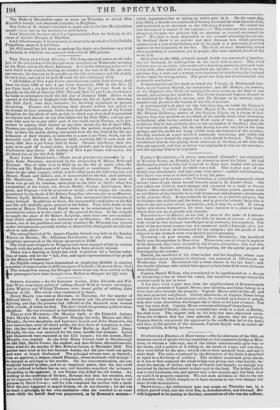SPRING ASSIZES.—At the Leicester Assizes, John Edwards and Wil- liam
Watt were found guilty of robbing Daniel Wall of twelve sovereigns. John Watkins and William Thomson were found guilty of robbing John Carver of 341. The whole were condemned to death.
Henry Hewitt was tried at Horsham, on Thursday, for the murder of Edward Smith. It appeared that the deceased and the prisoner had been lighting, and that the prisoner had inflicted on the deceased some wounds with a knife, of which he died. The Jury found the prisoner guilty of man- slaughter. He was sentenced to banishment for life.
TRIALS FOR Muanan.—On Monday week, at the Limerick Assizes, John Murphy the father, Margaret Murphy the wife, Honore and Mary Murphy, the two daughters, and Lawrence Lynch and John Dunworth, the two sons-in.law, were all found guilty, the first three of conspiracy to mur- der, the last three of the murder of Walter Burke, in April last. James Murphy, the son, was executed fir the same murder last summer. Lynch and Dunsworth were executed on the 17th instant ; but the female Mary Murphy, was respited. At the Irish Home Circuit, held at MaryCorough on the IfIth, David Cowen, the nephew, and Ann Grimes, the maid-servant, were tried for the murder of Mrs. Rebecca Cowen, in December 1828. The parties were tried at the last Summer Assizes, but the jury could not agree, and were at length discharged. The principal witness now, as formerly, was an approver, a ;woman named Brennan, whose husband—still at large— 's charged as principal in the murder. On her cross-examination, she con- tradicted herself so often, and on so important points, that the jury could not be induced to believe her on any, and therefore acquitted the prisoners. According to the approver, it was Grimes who killed the old woman. Ac- cording to the confession Of Grimes, Brennan first beat her senseless, and, as he supposed, killed her with a whip-handle, which was given him for the purpose by David Cowen ; and his wife completed the murder with a spade. How the Jury happened to acquit Grimes, we do not discover ; for she was as much a principal, by her own confession—that she watched in an outer room while the horrid deed was perpetrated, as by Brennan's account—
which represented her as taking an active part in it. On the same day, (the 18th), a female was convicted of having drowned her male bastard child, and sentenced to be executed on the following Saturday. We notice the case because of a remark of the reporter :—" The witnesses were not cross- examined, because the prisoner had no attorney or counsel concerned for her." The fact is most disgraceful to the counsel attending the circuit. In Scotland there is an ancient and most humane law, which provides against such a case of destitution, and in Eneland it is practically provided against by the humanity of the bar. The Irish are ever blarneying about their generosity of sentiment, yet no people offer more marked proofs of the want of it.
At Carlow on the 20th, a wretch named Smith was convicted of murder- ing her husband, by striking him on the head with a stone. The chief witness was an associate, who confessed to knocking down the deceased witlt a hay-fork, after which the wife completed the murder.—At Tralee, on the previous day, a man and a woman were convicted of murdering the husband of the latter by strangulation. The proof was long and circumstantial, bat extremely conclnsive. A court-martial sat last week on board the Victory., in Portsmouth har- bour, to try Captain Russell, die commander, and Mi.- Hodges, the master, of his Majesty's ship Wolf, for running the ship ashore on the 10th of last month, and causing her total loss. The Court sentenced Captain Russell to be dismissed his Majesty's service, and Mr. Hodges to be severely repri- manded and placed at the bottom of the list of masters. A court-martial took place on the following day, on board his Majesty's ship Victory, of which Captain John Hayes, C. B., was president, to try Mr. Thomas Holloway, master of the Galatea frigate, on a charge of bar- ing run that ship on shore on the elbow of the middle shoal, when returning to Spithead, after having assisted the Wolf sloop of war. It appeared in evidence, that he was perfectly alive to the navigation of the ship ; that the lead was constantly going; but the tide having run out very low at the then springs, and the marks not being visible from the haziness of the weather, the ship touched on a part which is constantly increasing, and which the local pilots have frequently expressed a wish should be buoyed. The Court determined that he was paying strict attention to his duty, at the time the ship got aground, and that no blame was imputable to him on the occasion; and did adjudge him to be acquitted.


















 Previous page
Previous page